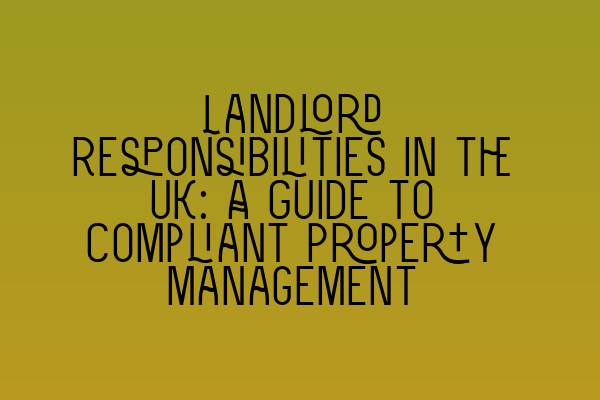Landlord Responsibilities in the UK: A Guide to Compliant Property Management
Being a landlord in the UK comes with a range of legal responsibilities. Whether you are new to the property rental business or have been in the game for years, it is crucial to understand and adhere to these obligations to ensure compliant property management. In this comprehensive guide, we will walk you through the essential landlord responsibilities and provide insights on how to navigate the intricacies of property law in the UK.
Rental Property Safety
One of the primary responsibilities of a landlord is to ensure the safety of their rental property. This includes maintaining the structural integrity of the building, as well as ensuring that gas, electrical, and fire safety standards are met.
If you are unsure whether your rental property meets the required safety standards, it is advisable to seek the assistance of a qualified professional. They can conduct safety inspections and issue necessary certifications, giving you peace of mind knowing that your property is in compliance with the law.
Tenancy Agreements and Contracts
Another crucial aspect of landlord responsibility is the creation and management of tenancy agreements and contracts. These legal documents outline the terms and conditions of the tenancy, including rent amounts, payment schedules, and duration of the tenancy.
To ensure compliance, it is recommended to engage the services of a qualified solicitor who specializes in property law. They can help draft legally binding agreements that protect both your interests as a landlord and the rights of your tenants.
If you require assistance with drafting or reviewing tenancy agreements, you may find our SQE 1 Practice Mocks FLK1 FLK2 courses helpful. These courses provide comprehensive training in property law to help you navigate the complexities of rental contracts and ensure compliance with UK tenancy laws.
Repair and Maintenance
As a landlord, you have a responsibility to maintain your rental property and ensure that it is in a safe and habitable condition for your tenants. This includes promptly addressing any necessary repairs and maintenance issues that may arise during the tenancy.
Regular inspections can help identify maintenance needs before they become major problems. It is also recommended to keep thorough records of all repairs and maintenance activities to demonstrate your commitment to providing a well-maintained property.
For guidance on handling repairs and maintenance, you may find our SRA SQE Exam Dates useful. These resources provide valuable insights into the legal requirements for property maintenance and can help you prepare for any relevant exams or assessments.
Deposit Protection
In the UK, landlords are legally required to protect their tenants’ deposits in a government-approved scheme. These schemes aim to protect tenants’ rights and ensure fair treatment when it comes to deposit deductions or returns at the end of the tenancy.
Failure to comply with deposit protection requirements can result in severe penalties, including being unable to serve a Section 21 notice to regain possession of your property. Therefore, it is essential to familiarize yourself with the specific deposit protection regulations in your region and ensure compliance.
To learn more about the regulatory obligations related to deposit protection, you may want to explore our SQE 2 Preparation Courses. These resources provide comprehensive training on property law, including deposit protection, to help you stay up-to-date with the latest regulations and pass any relevant exams.
Tenant Communication and Dispute Resolution
Effective communication with your tenants is crucial for maintaining a positive landlord-tenant relationship. It is important to respond promptly to tenant inquiries or concerns, address any issues they may face, and provide clear instructions on rent payment methods and procedures.
However, disagreements and disputes can still arise despite your best efforts. In such cases, it is advisable to attempt to resolve conflicts through constructive conversation and negotiation. If a resolution cannot be reached amicably, you may need to resort to legal channels, such as mediation or court proceedings.
To prepare for any potential disputes or legal proceedings, you may find our SQE 1 Practice Exam Questions helpful. These practice quizzes provide an opportunity to test your knowledge of property law and familiarize yourself with the types of questions you may encounter in an exam setting.
Conclusion
As a landlord in the UK, it is essential to understand and fulfill your legal responsibilities to ensure compliant property management. This includes meeting safety standards, creating comprehensive tenancy agreements, maintaining the property, protecting deposits, and effectively handling tenant communication and disputes.
If you require further assistance or guidance, do not hesitate to consult with a solicitor specializing in property law. They can provide expert advice tailored to your specific circumstances and help ensure that you adhere to all legal obligations.
At SQE Property Law & Land Law, we offer a range of courses and resources to help landlords navigate the complexities of property management. Visit our website to explore our SQE 1 Preparation Courses and SQE 2 Preparation Courses to further enhance your knowledge and expertise in property law.
